Change Makers at the SLJ Leadership Summit
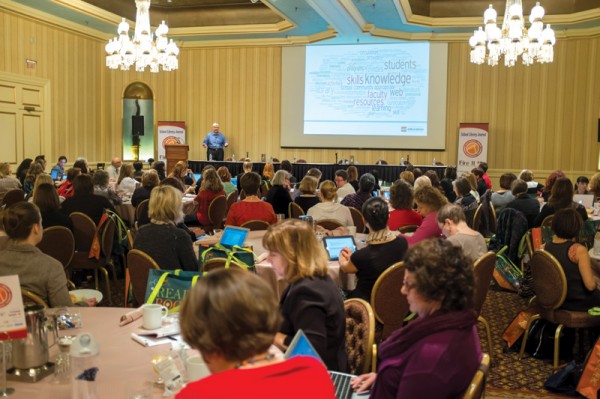
SLJ Leadership Summit attendees tune in while LEGO Education’s Stephan Turnipseed addresses the crowd.
Intrepid and innovative school librarians came from all corners of the United States (and Canada) to St. Paul, MN, a hub for institutional publishers, on October 25─26 for School Library Journal’s 10th annual Leadership Summit, Fire it Up! Sparking Creativity and Motivating Students. Key conversations and presentations over the weekend centered on school media specialists’ changing roles in schools and communities, how best to incorporate technology in order to meet 21st-century learning goals, and the importance of reaching all readers and learners.
”The library is the last place where kids can learn led by their interests,” shared David Samuelson of Capstone Publishing, a platinum sponsor of the two-day event. Samuelson debuted an inspirational video campaign called #SchoolLibrariesMatter, celebrating school librarians. Rebecca Miller, editorial director of SLJ and sister publication Library Journal, expressed the same sentiment in her opening remarks. “Look at how librarians are transforming schools. We have a room of leaders here," she said. "What do you need to start and sustain a burning desire to learn? Fuel, oxygen, and ignition. You bring all three to our schools.”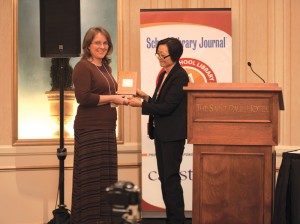
SLJ’s Kathy Ishizuka presents school librarian Holly Whitt with the Build Something Bold Award.
Several special announcements at the Summit included the presentation of the winners of the “Build Something Bold” Library Design Award, presented by SLJ and LEGO Education to school librarian Holly Whitt of the Walnut Grove Elementary School, in Madison County, AL, and the Buzz Award, from SLJ and Brain Hive, to Denise Sumida of the Pearl Harbor (HI) Elementary School.“A culture of advocacy and efficacy”
Opening the first day’s lineup was a rousing keynote by 2013 Superintendent of the Year Mark Edwards, whom Scott Chain of Follett introduced as a man filled with incomparable passion, drive, and dedication to education and a as charter member of Project Connect, a national initiative convening thought leaders to support the needs of 21st-century schools. Edwards, the leader of the much-lauded Mooresville (NC) Graded School District, shared that what sets apart his district from others is the integration of school librarians into every aspect of learning. When 10 percent of the school staff had to be cut, Edwards never thought once to cut librarians. “The team is having an impact on every teacher and school in the district," said Edwards. "The librarian is an orchestra leader helping students find their music and harmony.”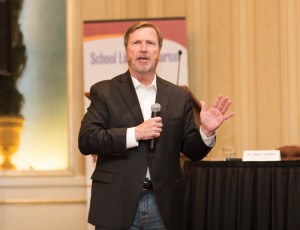
Keynote speaker Mark Edwards.
The superintendent emphasized that the success in their library program is due to the “all in” attitude and the active participation of the school media coordinators, and their willingness to build “a culture of advocacy and efficacy.” Edwards stated that the school media center at his nearly 1:1 district encourages “a sense of discovery, connectivity, and collaboration” and that it’s always, “humming with activity.” The educator’s mantra has become “every child, everyday,” and he encouraged attendees to lead with the same objective. Edwards’s keynote was followed by a presentation led by his team on practical examples of how each member implemented changes to the library’s role, all the while becoming an important and indelible part of instruction in their schools. Scott Smith, Mooresville's chief technology officer, emphasized the incorporation of the 4C’s into the curriculum: creativity, critical thinking, collaboration, and communication. Susie Harkey, elementary media coordinator, spoke about digital citizenship, sharing how third graders in her school created their own infomercials on how to be safe online, shown in every classroom as part of the morning announcements. Mesha Laksy, media coordinator, shared the different tools and resources, such as Google Forms; iCurio; BrainPop; and Discovery that she has used to ignite critical thinking.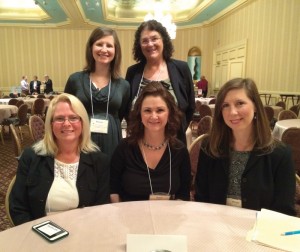
Mooresville (NC) media specialists Mesha Lasky,Terry Lehmann, Allison Long, Susie Harkey, and Kristi Kallio.
Allison Long, teacher librarian of the East Mooresville Intermediate School, encouraged participants to spearhead communication with colleagues, kids, and partners via newsletters, websites, blogs, and old-fashioned outreach. She also suggested using Blendspace for collaborative lesson planning with teachers, a change they implemented which led to an increase of collaborative learning with students. Kristi Kallio and Terry Lehmann, media specialists at Mooresville High School, concluded the keynote panel by presenting different ways they’ve transformed their methods of communication. One change they have made includes providing weekly newsletters with library statistics to administrators and teachers and highlights of different resources used by students. They also create student-led projects. “A visit to the library is no longer a ‘rock and read’ event, in which we read to them from a rocking chair,” Harkey said. “Instead, we have a more interactive relationship with the students.” In his closing remarks, Edwards, revealed that for seven years, with the help of local businesses, churches, and even the town of Mooreseville, all of the kids in their district have Internet access at home, on Main Street, and the city parks. From a partnership with the local service provider, any student that is eligible for free and reduced lunch now has free Internet access at home.Smart stakeholders
In a panel led by Michelle Luhtala, the library department chair of New Canaan (CT) High School, the event’s sponsors were able to share their thoughts on the future of school libraries. When asked about the explosion of 1:1 and BYOD (Bring Your Own Device) programs, they each emphasized the importance of more partnership among stakeholders to provide access to all students. ABDO’s Monte Kuehl stressed the ever-increasing need for trained librarians to be effective users of devices and information so that they can then educate their teacher collaborators. Roger Rosen of Rosen Publishing sees the issue as an ongoing social justice concern. Patricia Stockland of Lerner Publishing assured the audience that the company’s first and foremost focus is on the quality of the content. When it comes to preparing for the needs of future learners, Dottie Coven of Baker & Taylor said that she is resolved to partner with educators to think outside the box and to keep evolving with the technology. Terri Soutor of Brain Hive shared her hope that more project-based learning and integration of the digital into curriculum will become more the norm as librarian leaders educate administrators and classroom teaches. Scott Chain of Capstone reiterated that partners on both side of the table have to prepare for different types of learners in order to provide equal access to all students. Trisha McDonell of LEGO Education expressed to the appreciative audience, “Companies are not looking for people to bubble in a test; they’re looking for people that can solve problems.” Dave Schroeter of Gale Cengage spoke about how most of the pushback against digital content came from classroom teachers, not librarians. Schroeter added that librarians and vendors should continuously evaluate whether a tech decision is being made for change’s sake or if it actually makes sense for students’ needs. Eric Fitzgerald of Capstone shared that he doesn’t think libraries and librarians should evolve, but they do need re-branding. “Librarians have always been the drivers of collaboration and innovation,” he said. “Perhaps what needs to change is just some of the window dressing.” Junior Library Guild’s Deborah Ford suggested mainstream media ads to bust librarian myths and stereotypes, "Because we’re so beyond the bricks and mortar, but if we don’t tell them, they won’t know.” Randal Heise of Mackin urged, “If you’re going to be part of the future, you have to climb in.”“Science is an ongoing story”
The afternoon’s program concluded with an eye-opening panel on “Journeys Near and Far” moderated by SLJ editor Daryl Grabarek. These authors take “a really close look at the lives of scientists and how the work that they do is a result of research and trial and error. These books give kids the vocabulary to talk about subjects they never would have known about,” said Grabarek in her introduction. Touching upon topics as varied as butterfly pupa and wave energy, panelists Loree Griffin Burns, Elizabeth Rusch, and Joyce Sidman spoke about how curiosity and a love of research can make anyone a scientist.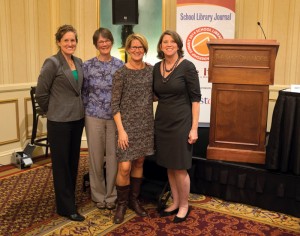
Authors Loree Griffin Burns, Joyce Sidman, and Elizabeth Rusch, and SLJ’s Daryl Grabarek.
Burns, author of Citizen Scientists (Macmillan, 2012) and most recently Handle With Care: An Unusual Butterfly Journey (Millbrook, 2014), explained that she was inspired by a trip to a butterfly museum with her children to chase the story of the pupas origins all the way to Costa Rica. “I saw something unusual, and I had some questions about it, and I let myself have the time to get the answers.” Burns encouraged attendees to let libraries be the places where children are allowed to journey while searching for answers. Rusch, the author of several “Scientists in the Field” titles published by Houghton Harcourt, approaches each project with the hope of showing young readers that “Science is an adventure.” When first starting on her Mars Rover, naysayers told her that the book would be published years after the two spacecraft made it to Mars. However, 10 years after they were blasted into space, Opportunity is still roving on the planet, proving that “Science is an ongoing story,” according to Rusch. Award-winning poet and children’s book author and Minnesota denizen Joyce Sidman shared that poetry is a way of seeing the world and making connections, and a natural way to explore science. “To be a poet you have to observe and look very closely at the world around you,” she said.Harnessing the creativity gap
The Summit’s second day began with a rousing keynote by Stephan Turnipseed, CEO of LEGO Education, introduced by SLJ executive editor Kathy Ishizuka. Complete with dance moves, LEGO ducks fashioned by attendees, and a stirring call to action, Turnipseed’s presentation began trending on Twitter as participants shared his nuggets of wisdom about education via social media. Quoting philosophers, writers, and theorists as varied as Mark Twain, Socrates, and Sir Isaac Newton, the talk on 21st-century learning and how it relates to libraries elicited laughs, cheers, and even tears from the audience. A member of the 21st Century Skills organization, LEGO Education promotes the need for skills and knowledge, “bridging the gap between theory and practice.” Turnipseed shared that they believe in “learner-centricity,” where the learner is the center of education and in graduation with mastery rather than graduation with certification. In order to be successful in the 21st -century, kids should be learning in three basic areas: knowledge, skills, and dispositions. The keynoter went on to define Knowledge as “making sense out of the experiences that we have—a uniquely creative process. In an educational system that places importance on testing, oftentimes creativity is stifled. “Libraries can harness this creative gap,” he said.Finding your librarian “spirit animal”
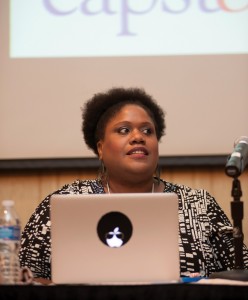
Chicago school librarian K. C. Boyd.
Channeling that same collaborative energy, Doug Johnson, Joyce Valenza, K.C. Boyd, and Michelle Colte put a creative spin on the leadership panel following the keynote. Each discussed their leadership style by comparing themselves to a creature, and attendees were invited to share their personal “spirit animal” via Padlet. Johnson, the director of technology for the Burnsville-Eagan-Savage (MN) Public Schools, considers himself a cockroach librarian—a survivalist who evolves with his institution. Valenza, “Neverending Search” blogger and director of the Library and Information Science Masters program at Rutgers University, NJ, chose the goose as her moniker. She cited the bird’s bravery, grit, its ability to take care of its own as a perfect correlation for librarians’ “Leadership culture in action.” Valenza also encouraged attendees to learn from fellow flock members: “Take advantage of the birds that fly ahead of you…. Honk, blog, and tweet. Show your students what professional leadership looks like.” Because of recent events at her school, library media specialist Boyd, of the Wendell Phillips Academy High School in Chicago, IL, identifies with the bobcat. “My program was being slowly marginalized, and there were plans to release me from my position the week that School Library Journal published the article about me online,” she explained while the shocked audience applauded. “My job is safe for this year. But over 50 percent of Chicago public schools don’t have a librarian. In response, we created Chi Schools Librarians. Our goal is to have a certified librarian in every public high school in Chicago. I’m normally not an outspoken person. But when you back a librarian into a corner, she comes out fighting.”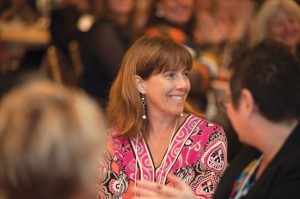
Michelle Colte, SLJ School Librarian of the Year.
SLJ’s inaugural School Librarian of the Year, Michelle Colte, rounded out the menagerie by selecting the chimpanzee. The library media specialist from Hale Kula Elementary School, Wahiawa, HI said that one of her goals in her school, mostly made up of students with military parents, is to bring the feeling of “Ohana” or family to the base. With projects such as the Cardboard Challenge and Hour of Code, she enjoys providing the fun part of learning.Speed learning
In five 15-minute presentations led by school media specialists, Summit participants were served a smorgasbord of ideas to implement in their own schools. Andy Plemmons from David C. Barrow Elementary, in Athens, GA, and a School Librarian of the Year finalist, shared how a portion of his book buying budget is decided upon by his own students, who survey their classmates, research book titles, interact with publishers, and purchase books. They then market the books, creating signage, and designing displays. These speed sessions also highlighted a local victory. Tori Jensen, media specialist, LEAP High School/St. Paul Public Schools and Leslie Yoder, digital literacy and learning specialist, shared with attendees how the plight of St. Paul’s school libraries has gone from near-tragedy to a community success story. With the help of the teacher’s union, parents, and students—a partnership that resulted in a walk-in during a snowstorm—Saint Paul Public Schools will be adding up to 15 new school media positions by the fall of 2015, and are striving for more. Pernille Ripp, seventh grade teacher in Middleton, WI, presented on the Global Read Aloud Project. Ripp encouraged her students to share their love of reading with others by using social media to connect with classrooms around the world. Participants can read aloud to an elder, a friend, or even the principal. Current titles include The Miraculous Journey of Edward Tulane (Candlewick, 2006) by Kate DiCamillo and The Fourteenth Goldfish (Random House, 2014) by Jennifer L. Holm. Tasha Bergson-Michelson, instructional and programming librarian, and Jole Seroff, director of library information Services of Castilleja School in Palo Alto, CA, shared with attendees how they’ve tried to install a love learning, reading, and research in each student at their all-girl independent school. A common obstacle is that it’s hard for students to get started with research. Using the example of “the historical veracity of Downton Abbey facial hair,” the pair presented how they devised strategies to model tacit research techniques for teachers and kids. Lauren McBride talked about her “Feed and Read for South Sudan” program, in which the school librarian helped her students organize a book club that raised awareness about the lack of clean water and food in the war-torn country. Kids from Seneca Ridge Middle School of the Loudoun County Public Schools, VA, were inspired after reading Linda Sue Park’s A Long Walk to Water (HMH, 2010) to raise funds and address that need. Working with the nonprofit organization Sudan Sunrise, the members of the book club scheduled and moderated a presentation and panel by Sudanese former Lost Boy Jacob Atem and raised enough money to purchase 15,000 school lunches and a well of clean water for a town in Sudan. M McBride encouraged, “If there’s something wrong in the world, students have the power to change it, and you have the power to help them.”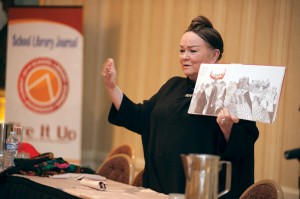
Author Patricia Polacco.
The two-day event ended on a sweet, inspirational note. Award-winning author Patricia Polacco shared a heartwarming family story, dedicating it to her recently deceased brother, Fred, about the importance of educators. Polacco showed her iconic keeping quilt, the subject of her book The Keeping Quilt (S. & S., 1988), that has been passed down for generations. Polacco honored the memory of her parents, who instilled in her the love of stories, and her former teachers, who pushed her to do well in school despite her learning disabilities. "Honey is sweet and so is knowledge, but knowledge is like the bee that made that sweet honey, you have to chase it through the pages of a book," she added, thanking all of the librarians present for the work that they do.RELATED
The job outlook in 2030: Librarians will be in demand
The job outlook in 2030: Librarians will be in demand
ALREADY A SUBSCRIBER? LOG IN
We are currently offering this content for free. Sign up now to activate your personal profile, where you can save articles for future viewing






Add Comment :-
Be the first reader to comment.
Comment Policy:
Comment should not be empty !!!